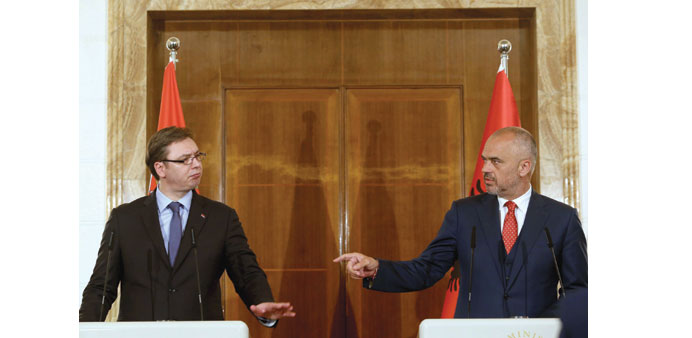Albanian Prime Minister Edi Rama (right) and his Serbian counterpart Aleksandar Vucic give a press conference in Tirana yesterday.
AFP
Tirana
The prime ministers of Serbia and Albania, Aleksandar Vucic and Edi Rama, in an historic visit yesterday vowed to strengthen their fragile ties in the interests of the future stability of the Balkans.
“There was a chilly period between Belgrade and Tirana but this (Vucic’s) visit is a sign of the will of the two countries even if we are far from agreeing on all” issues, Rama said at a joint press conference marking the first visit by a Serbian head of government.
At the heart of the mutual friction was Kosovo, the former Serbian province with an ethnic Albanian majority which unilaterally declared independence in 2008.
Belgrade still refuses to recognise it as a nation, unlike some 100 countries including the US and most nations in the European Union.
“The relations between Albania and Serbia and Albanians and Serbs are the key for the future of the region”, which was torn apart by a series of inter-ethnic wars in the 1990s, Rama said.
But the two countries “could do what Germany and France did for peace” after World War II, he added.
Vucic said he believed that “ties between Serbs and Albanians will be the backbone of relations in the Balkans.”
“We extend our hand of friendship to Albania,” he said.
Vucic’s historic visit comes six months after Rama visited Belgrade in the first visit by a Tirana head of government for 68 years.
Tight security measures were taken for the visit with some 1,300 policemen deployed in the capital, local media reported. Helicopters were hovering while traffic was blocked in areas.
Meanwhile bilateral tension over Kosovo has been exacerbated by claims from Serbia’s ethnic Albanian minority for more autonomy - or even unification with Kosovo’s ethnic Albanian majority.
Both prime ministers yesterday repeated that their views on Kosovo remained unchanged.
“We have an irreconcilable view on Kosovo,” said Rama, adding that Tirana firmly supported an ongoing Brussels-sponsored dialogue between Belgrade and Pristina.
The view of the two premiers was shared by political analysts.
“The region’s European future depends also on reconciliation between Albanians and Serbs and cooperation between Albania and Serbia,” political analyst Albert Rakipi told AFP.
Analyst Lufti Dervishi said the Vucic visit was breaking “decades of chill between the two countries.”
Relations between Serbs and Albanians have been further strained by fears in Belgrade of a “Great Albania,” a nationalist project to unite all Albanians in one state, including Kosovo and parts of Macedonia and Serbia.
Both Albanian and Kosovo authorities assure that no such plan exists.
“There is no project of a ‘Great Albania’ but a project to unite our countries, Serbia, Albania, countries in the region ... within the EU,” Rama stressed yesterday.
A war between Serbian armed forces and the pro-independence guerrilla movement in Kosovo in 1998-1999 was followed by a Nato bombing campaign to stop a crackdown by late president Slobodan Milosevic’s regime against the ethnic Albanian population.
The Serbian army and police were eventually forced by Nato to leave Kosovo, which in 2008 proclaimed independence.
During his visit to Belgrade last November, Rama urged Vucic to face up to the reality of Kosovo’s independence, provoking angry responses from his host and the Serbian public.
Rama’s visit had been delayed for three weeks following trouble at a mid-October football match in Belgrade, a Euro 2016 qualifier between Serbia and Albania that had to be abandoned.
Serb fans invaded the pitch and attacked Albania’s players after a pro-Albanian flag with a map of a “Great Albania” was flown over the stadium by a drone.
Despite the friction, the two men agreed to continue working towards an improvement in relations.
Vucic’s visit also comes at a time of tension elsewhere in the Balkans.
Earlier this month Macedonian police clashed with an ethnic Albanian armed group, most of whose members were from Kosovo. Eighteen people were killed, including eight police officers.

